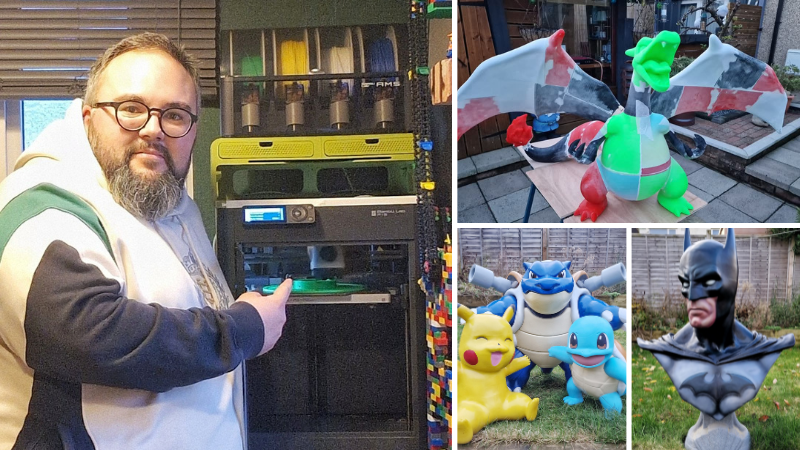
Workforce Wellbeing Officer Kristian Speirs dedicates his days to supporting the health and wellbeing of Team NWAS members. Whether by offering advice, sharing coping strategies, or simply providing a listening ear, Kristian plays a vital role in supporting staff. Given his commitment to others, it’s important that Kristian also prioritises his own wellbeing and he’s found a unique way to do just that through his hobby of 3D printing.
Kris originally started 3D printing five years ago when he received a printer as a gift. Reflecting on his start, he shared, “It wasn’t something I had ever really thought about before, but it all began from there. The printer I got was quite basic, so it required a lot of tinkering and fixing. While some people might find that tedious, I enjoyed it because it helped me learn how 3D printers work, which added another layer of interest to the hobby and sparked my curiosity. The hands-on nature of fixing and improving the printer was something I quickly grew to enjoy, and it became a creative outlet for me.”
Like many hobbies, 3D printing comes with a learning curve. Kristian explained, “Learning how everything worked was part of the fun. It’s not as simple as just pressing ‘print’. You need to prepare the files by slicing them to ensure they print correctly, and there can be a lot of post-processing depending on what you’re making. This hobby has also taught me new skills, like spray painting, which was completely new to me.”
Over time, Kristian’s hobby has evolved into a passion. He now prints most days, as many projects require hundreds of hours to complete. He said, “You can make almost anything you can think of. My personal interest is in larger models and characters from franchises like Pokémon and Marvel. I’ve also printed practical items for everyday use, toys and gifts.”
Currently, Kristian is working on an ambitious project: a Pokémon character printed at 850% of its original size. He shared, “Each piece takes around 20 hours to print, and the finished model will stand about five feet tall. Once all the pieces are printed, I will assemble and paint it.”
Discussing how this hobby has helped his mental wellbeing, he said, “I have a small outbuilding in the garden where I keep all my printers. It’s a space I’ve transformed into a dedicated room , from learning how to plaster and fit units to creating a LEGO wall. It’s a place where I can focus and do my own thing, whether it’s working on the computer to prepare files, printing, or painting. Having that space allows me to disconnect from the busy world and concentrate on something I enjoy.”
Research shows that hobbies can improve mental wellbeing in various ways, including stress relief, creative expression, and a sense of purpose. Kris agrees and said, “The world is a busy place, and I think it’s important to have something that’s just for you. Finding an activity you enjoy and doing it for yourself can be incredibly rewarding. Learning a skill or focusing on a hobby helps you concentrate, take a break, and feel accomplished.”
Kristian encourages others to find their own passion, “Life is not always easy, but finding something you enjoy and concentrating on it for yourself can make a big difference. Take time out to do something you love, even if it’s just a small step at first.”
If you are struggling or feeling low, here’s a reminder of some important numbers that could help you:
- Samaritans – Call: 116 123 – 24/7
- Text Shout to 85258 – 24/7
- CALM – Call: 0800 58 58 58 – web chat 5pm to midnight every day
- PAPYRUS Hopeline247 – Call: 0800 068 4141 or text: 88247 – 24/7
- Mind Infoline – Call: 0300 123 3393 – 9am to 6pm, Monday to Friday (except for bank holidays)